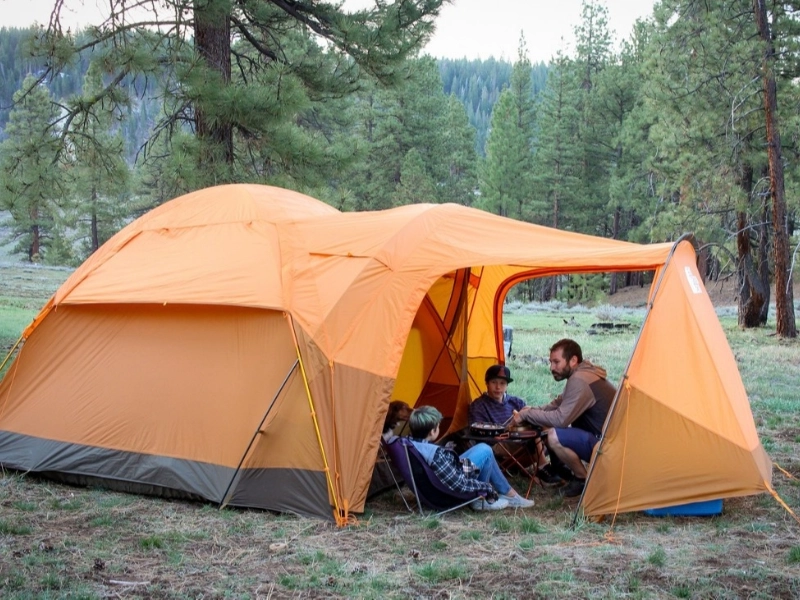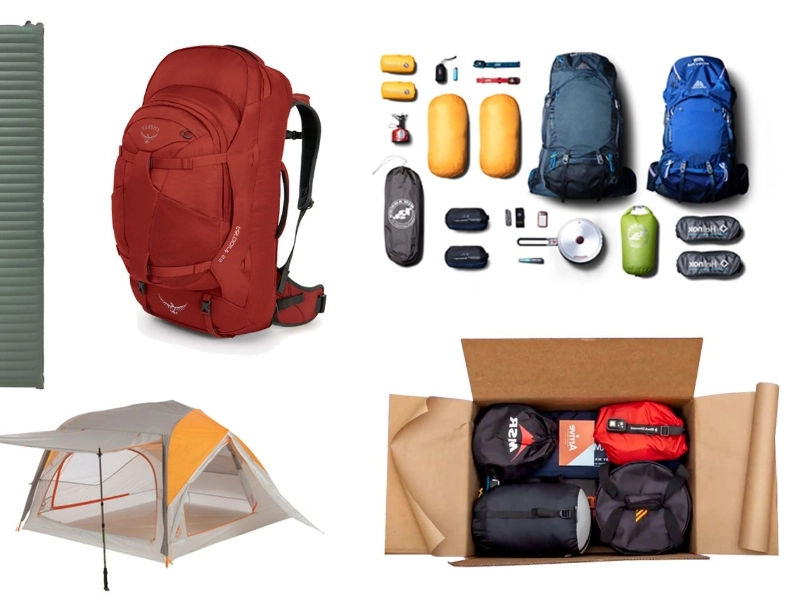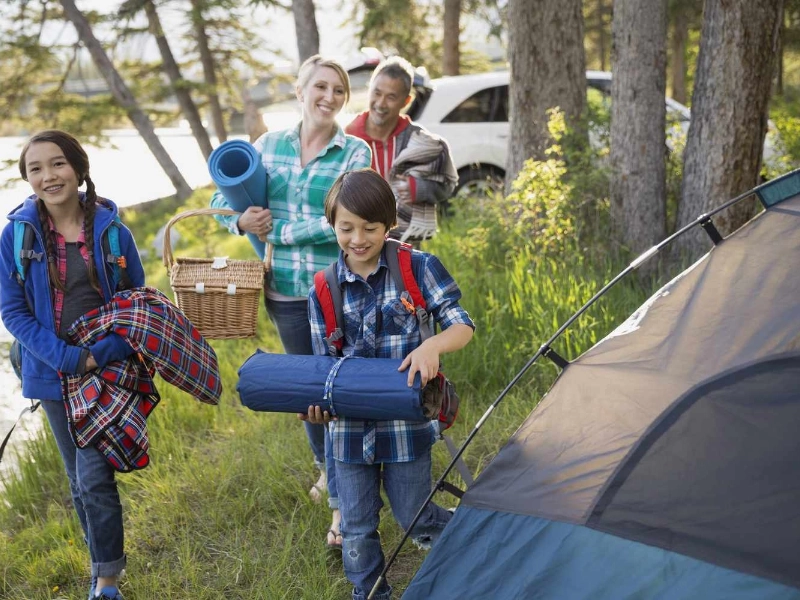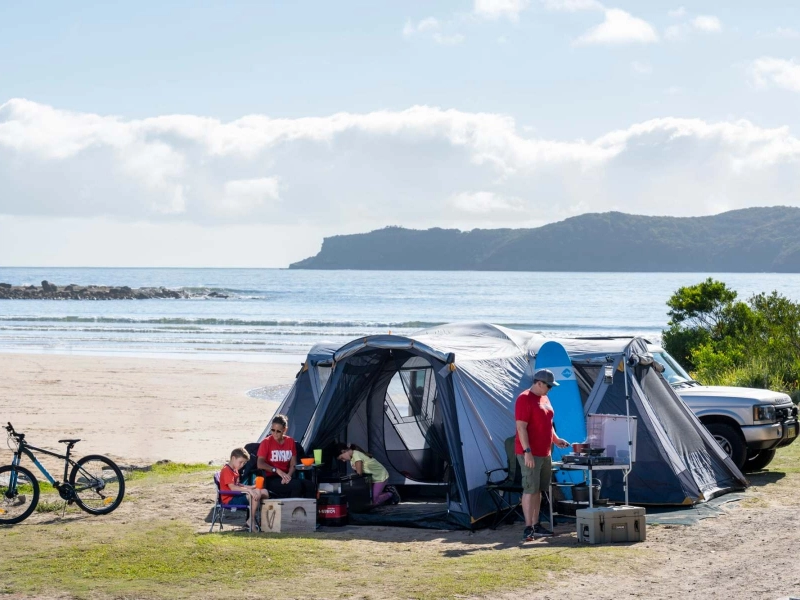Starting at a conventional campsite, such as one in a state or national park, is the greatest way to learn the fundamentals of camping. There are paved pathways, restrooms, and staff available to assist you with any queries at these places. But once you've gotten the hang of it, consider scattered camping on open space outside the park.

 All you really need to survive a camping trip is a tent and a sleeping bag. Although you can get more equipment to make your stay more pleasant, having these necessities is a must.
Depending on where and how you intend to camp, the remaining items on a camper's checklist vary. For instance, having a bonfire will keep you warm, but if you're travelling, you'll need access to water. In addition, if you plan to visit scattered campsites, you should bring a lantern or headlamp and a map or GPS.
Another essential that cannot be compromised is toilet paper; any camper without a latrine will soon find that leaves and bark make poor substitutes. Lastly, a pocket knife will come in helpful while packing for a camping trip. It can be used to skin a small animal, cut bait, open tightly sealed packages, and trim ropes. A first aid kit is also something you should pack because unexpected things can happen outside.
All you really need to survive a camping trip is a tent and a sleeping bag. Although you can get more equipment to make your stay more pleasant, having these necessities is a must.
Depending on where and how you intend to camp, the remaining items on a camper's checklist vary. For instance, having a bonfire will keep you warm, but if you're travelling, you'll need access to water. In addition, if you plan to visit scattered campsites, you should bring a lantern or headlamp and a map or GPS.
Another essential that cannot be compromised is toilet paper; any camper without a latrine will soon find that leaves and bark make poor substitutes. Lastly, a pocket knife will come in helpful while packing for a camping trip. It can be used to skin a small animal, cut bait, open tightly sealed packages, and trim ropes. A first aid kit is also something you should pack because unexpected things can happen outside.
 Camping is a terrific way to decompress, whether you're looking to unwind on a vacation or enjoy an outdoor recreational escape with loved ones. But it requires meticulous planning, just like any trip. Inadequate planning can prevent unpleasant weather, uncomfortable bedding, and insect bites from ruining a camping trip.
After determining the perfect campground, it's time to go gear shopping. Check for products such as camp stoves, sleeping bags and tents. Ask staff members at outdoor stores for advice and read reviews. Many have professionals that are delighted to provide their wisdom to clients.
Recall to leave no trace—a set of rules designed to reduce your impact on surrounding species and environment—when you travel. Everyone on your camping vacation will have a better time if you remember this regard. Planning ahead is also essential for enjoyable games and activities to enjoy at the campsite.
Camping is a terrific way to decompress, whether you're looking to unwind on a vacation or enjoy an outdoor recreational escape with loved ones. But it requires meticulous planning, just like any trip. Inadequate planning can prevent unpleasant weather, uncomfortable bedding, and insect bites from ruining a camping trip.
After determining the perfect campground, it's time to go gear shopping. Check for products such as camp stoves, sleeping bags and tents. Ask staff members at outdoor stores for advice and read reviews. Many have professionals that are delighted to provide their wisdom to clients.
Recall to leave no trace—a set of rules designed to reduce your impact on surrounding species and environment—when you travel. Everyone on your camping vacation will have a better time if you remember this regard. Planning ahead is also essential for enjoyable games and activities to enjoy at the campsite.
 How much gear you pack for a camping trip depends on your own preferences. If you're going on a backpacking trip, you might want to carry everything you normally have at home in case of emergency, or you might want to pack light and simply bring the necessities.
Whatever your inclination, it's a good idea to get some experience with your equipment before your vacation. You can ensure that the larger equipment, like as sleeping bags or tents, fit and are comfortable by getting some practice with them. It may also inspire ideas about how to arrange your campsite.
Along with supplies to amuse yourself and your family, don't forget to bring a first aid kit. You can guarantee a pleasant and stress-free vacation with a little forward planning. In order to avoid causing environmental harm while on your expedition, it is also a good idea to be aware of the Leave No Trace philosophy.
How much gear you pack for a camping trip depends on your own preferences. If you're going on a backpacking trip, you might want to carry everything you normally have at home in case of emergency, or you might want to pack light and simply bring the necessities.
Whatever your inclination, it's a good idea to get some experience with your equipment before your vacation. You can ensure that the larger equipment, like as sleeping bags or tents, fit and are comfortable by getting some practice with them. It may also inspire ideas about how to arrange your campsite.
Along with supplies to amuse yourself and your family, don't forget to bring a first aid kit. You can guarantee a pleasant and stress-free vacation with a little forward planning. In order to avoid causing environmental harm while on your expedition, it is also a good idea to be aware of the Leave No Trace philosophy.